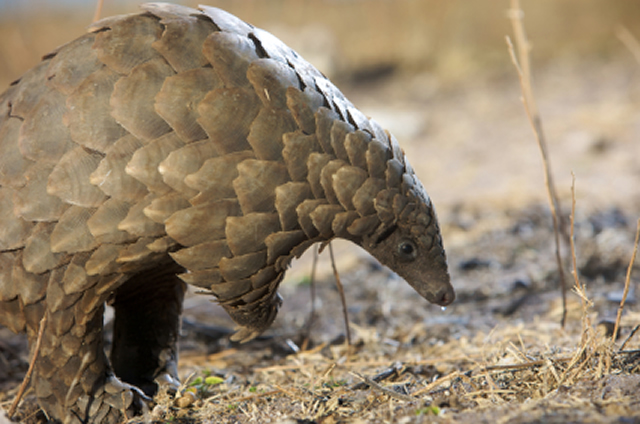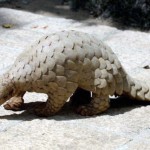Plans to perform a ‘ritual’ on a pangolin were thwarted in Zimbabwe.
Three Zimbabwean men have been sentenced after they were found in illegal possession of a pangolin, which they apparently intended to use in superstitious rites to improve their mining business.
Zimbabwe’s Bulawayo 24 reports that the three had purchased the pangolin from a middleman in Harare.
The intermediate alleges that he obtained the animal from an unnamed chief that was offering it specifically for performing rituals.
Acting on a tip-off, authorities apprehended the three men when they made a stopover in Bulawayo and found the frightened and constrained creature hidden in the trunk of their vehicle.
All three suspects plead guilty to violating Zimbabwe’s Parks and Wildlife Management Act and were ordered to pay a fine of $300 (USD), or else they would each be imprisoned for a period of six months.
New Punishments for Pangolin Poachers in Zimbabwe?
After a similar case only months ago, the need for stiffer penalties for pangolin poachers has become quite apparent.
Zimbabwe-based conservation group, Tikki Hywood Trust, reports that they have persuaded the government to increase fines for pangolin crimes.
At long last we have managed to persuade Zimbabwe National Parks and Wildlife Management Authorities to increase the poaching fine for pangolins from the current value of US$500 to US$5000.
Unfortunately, it seems legislative changes have not yet been made, or at least have not gone into effect, as the recent Bulawayo case does not reflect the increased fine.
African Demand for Pangolins
Although the four African pangolin species are faring somewhat better than the Asian species, they are still under threat due, in large part, to demand for their body parts.
In Africa, pangolins and their parts are used in various traditions, rituals, and especially in ‘muti’ (traditional medicine) trade.
Asia’s Black Market Trade Could Threaten Africa’s Pangolins
Conservationists are beginning to express concern over the fact that African pangolins could soon be targeted by poachers to supply East and Southeast Asian demand for their scales and flesh, in the wake of the dwindling and disappearing populations of Asian species.
Similar trends have been observed with other wildlife that is found on both continents.
For example, rhino poaching rates increased dramatically in Africa, after Asian species grew closer and closer to extinction.
Rhino horn has been an essential ingredient in traditional chinese medicine for centuries. An unfortunate proximity to China explains why the combined total of the three Asian rhino species (Javan, Sumatran, and greater one-horned rhino) is still smaller than Africa’s critically endangered black rhino population.
Today, these figures are approaching historical highs and now two rhino subspecies have recently been declared extinct: the Western Black Rhino and the Vietnamese Javan Rhino.
Surging Demand Threatens Extinction for Scaly Anteaters
The demand for pangolin flesh, fetuses, blood, and scales stems almost exclusively from East and Southeast Asia—mainly from China and Vietnam.
There, the animals’ scales and other body parts are used to make traditional Chinese medicines (TCM), while the flesh of adults and fetuses are considered a delicacy.
Consumers superstitiously believe pangolin-derived TCM concoctions can reduce swelling, improve liver function, facilitate weight loss, stimulate blood circulation, and enhance lactation in breast-feeding women.
However, there is no scientific evidence to support any of the medicinal claims made about pangolin body parts.
Rhino horn and pangolin scales, much like our own hair and nails, are chiefly composed of keratin.
Studies have repeatedly shown rhino horn to be void of any curative properties.
Read more about the illegal pangolin trade here.
Author: Sarah Pappin. Read more about Sarah here.
Image: © iStockphoto.com







Comments are closed.